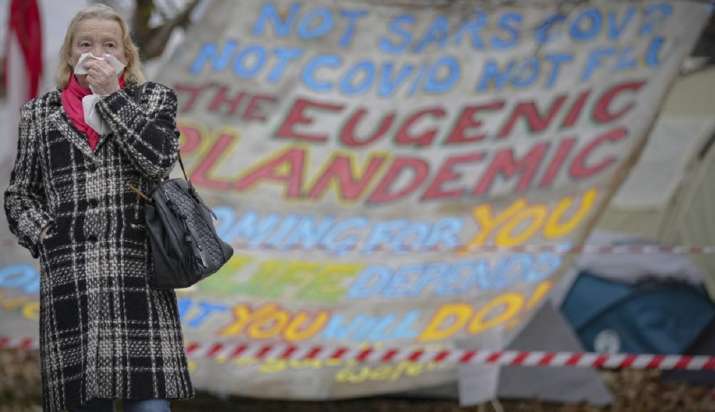
A woman covers her mouth and nose with a handkerchief as she walks through a small camp set up by opponents of COVID-19 safety rules in Vienna, Austria
Highlight
- The measures are expected to last a maximum of 20 days, but will be reevaluated after 10 days
- Austria hopes to lift measures on 13 December, but could keep another lockdown at bay
- Christmas markets in central Vienna were packed with people eager to buy presents on Sunday
Austria went into a nationwide lockdown early Monday to tackle rising coronavirus infections, a move that is being closely watched by other European governments slamming health care systems battling national outbreaks.
The measures are expected to last for a maximum of 20 days, but will be reevaluated after 10 days. They require people to stay at home apart from basic reasons like getting groceries, going to the doctor and exercising. Restaurants and most shops must be closed and large events cancelled. Schools and daycare centers may remain open, but parents are encouraged to keep their children at home.
Austria hopes to lift the measures on 13 December, but could impose a further lockdown without vaccination.
The new lockdown measures were kicked in a day after many Austrians enjoyed a hastily final day at coffeehouses and Christmas markets across the country.
Central Vienna’s Christmas markets were packed with people eager to buy presents and enjoy the last round of hot drinks and food on Sundays. At Vienna’s Freung Christmas market, Alexandra Lejcevic and her sister Anna sip mulled wine and punch among wooden stands and twinkling holiday lights.
“This is the last chance to feel the time and vibes of Christmas,” said Alexandra Lejcevic.
The sisters said that they feel most fortunate as their jobs will not be affected by the lockdown. But they are not optimistic that things will reopen as the government expected.
“It would be weird if in 20 days they said, ‘Okay, for the vaccinated people, you’re free to go,’ if the hospitals are still overwhelmed,” Anna Lejevic said. “That’s the only reason we even need a lockdown.”
Chancellor Alexander Schellenberg also announced on Friday that Austria would also introduce a vaccine mandate from February 1. The details of how the mandate will work are not yet clear.
In an interview on Sunday in the Kurier newspaper, Schulenberg said it was “sad” that the Austrian government had to resort to a mandate to ensure that enough people were vaccinated. Of Austria’s 8.9 million people, 66% are fully vaccinated, one of the lowest rates in Western Europe.
On Saturday, Austria reported 15,297 new infections, after a week in which daily cases topped 10,000. Hospitals, especially in the hardest-hit areas of Salzburg and Upper Austria, are overwhelmed by rising numbers of coronavirus patients in intensive care units.
Schalenberg said he and other officials had hoped this summer that a new lockdown would not be necessary and that implementing those affected by vaccination was a difficult decision.
“The freedom of the people needs to be restricted again, believe me, it is difficult even for me to bear,” he said.
The new measures, especially the vaccine mandate, have been met with fierce opposition among some Austrians and vaccine skeptics. According to police, 40,000 people, including members of right-wing parties and groups, took part in protests in the Vienna capital on Saturday.
Interior Minister Karl Nehmer said on Sunday that the country’s anti-coronavirus protest scene is radical.
According to the Austrian Press Agency, Nehamer said “an extremely diverse group of people” participated in the anti-vaccination protests, including concerned citizens but also right-wing extremists and neo-Nazis.
Austrian authorities have introduced the strictest lockdown measure to deal with a fourth surge in infections and deaths. Earlier this month, the government first tried to pressure unvaccinated people to take medicine, except in restaurants, hotels and large events. Then the authorities implemented the lockdown measures only for the illiterate.
Nehmer said Sunday that according to the APA, police conducted 150,000 checks in just one week to see if people outside their homes were following the new rules.
At the Christmas market, on Sunday in Vienna’s iconic Rathausplatz square, René Schlosser and Sylvia Weidenouer sip mulled wine from a heart-shaped red mug. They had come from their home in Austria’s Waldviertel region to catch a glimpse of the markets before everything closed.
“You have to accept it,” Weidenouer said of the lockdown. “There is no other option. You can only hope that these days when everything is closed will really make an impact.”
Read also | Germany resumes free COVID tests amid rising cases
,